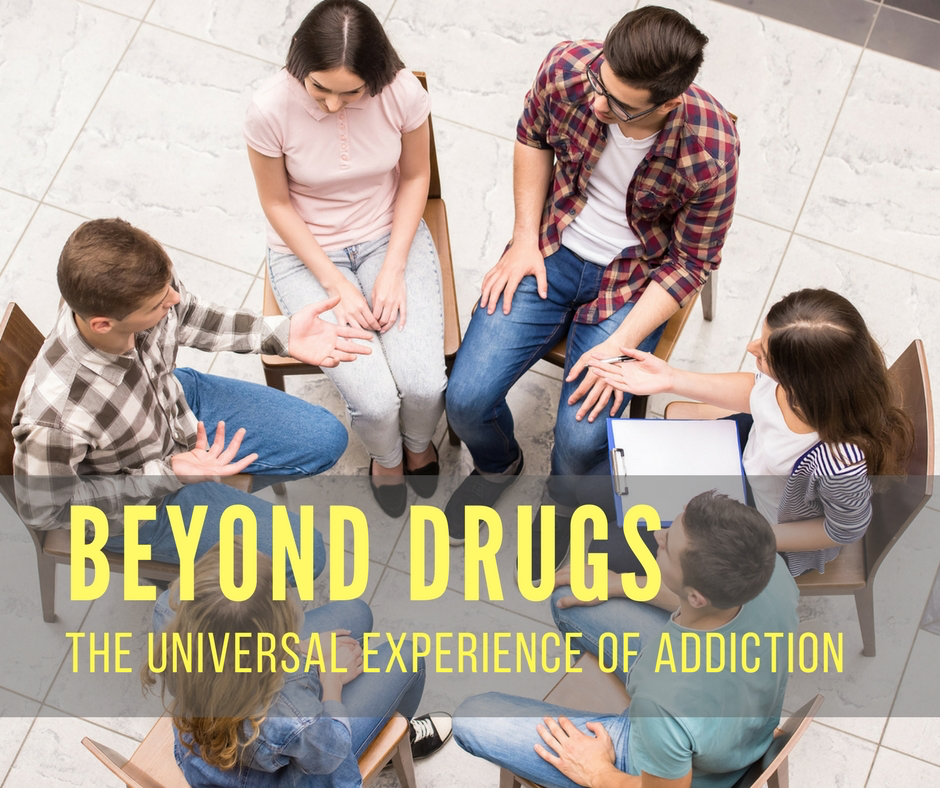With the carnage imposed by the current epidemic of opioids and associated overdoses across North America–many dozens of people dying every day– public alarm around addiction is focused almost exclusively on drugs. For all the anguish around substance dependence, addiction cuts a much broader swath across our culture. Most addicted people use no drugs at all and addiction cannot be understood if we restrict our vision of it to substances, legal or illicit.
Addiction is manifested in any behavior that a person craves, finds temporary relief or pleasure in but suffers negative consequences as a result of, and yet has difficulty giving up. In brief: craving, relief, pleasure, suffering, impaired control. Note that this definition is not restricted to drugs but could encompass almost any human behavior, from sex to eating to shopping to gambling to extreme sports to TV to compulsive internet use: the list is endless.
“I’m not going to ask you what you were addicted to,” I often say to people, “nor when, nor for how long. Only, whatever your addictive focus, what did it offer you? What did you like about it? What, in the short term, did it give you that you craved or liked so much?” And universally, the answers are: “It helped me escape emotional pain… helped me deal with stress… gave me peace of mind… a sense of connection with others… a sense of control.”
Such answers illuminate that the addiction is neither a choice nor a disease, but originates in a human being’s desperate attempt to solve a problem: the problem of emotional pain, of overwhelming stress, of lost connection, of loss of control, of a deep discomfort with the self. In short, it is a forlorn attempt to solve the problem of human pain. Hence my mantra: “The question is not why the addiction, but why the pain.”
And the source of pain is always and invariably to be found in a person’s lived experience, beginning with childhood. Childhood trauma is the template for addiction—any addiction. All addictions are attempts to escape the deep pain of the hurt child, attempts temporarily soothing but ultimately futile. This is no less true of the socially successful workaholic, such as I have been, than of the inveterate shopper, sexual rover, gambler, abject street-bound substance user or stay-at-home mom and user of opioids.
Not only is the urge to escape pain shared by all addicts, substance users or not, the same brain circuits are involved in all addictions, from shopping to eating to dependence on heroin and other opioids. The same brain circuits, the same brain systems involving pleasure and reward and incentive, the same neurochemicals—not to mention the same emotional dynamics of shame and lack of self-worth, and the same behaviors of denial and dishonesty and subterfuge.
It is time to realize, then, addiction is neither a choice nor an inherited disease, but a psychological and physiological response to painful life experiences. It can take many forms, but whatever form it takes:
• it employs the same neurological pathways and emotional patterns;
• the damage it does extends well beyond the suffering imposed by drug use specifically;
• to ostracize the drug addict as somehow different from the rest of us is arrogant and arbitrary;
• to criminalize certain substances, say heroin, while allowing the profitable distribution of more deadly products such as cigarettes is irrational and harmful—yes, though it may be a startling assertion it is medically a simple fact: heroin use, short of overdose, is far less lethal than cigarette smoke;
• to treat the addiction, which is a symptom, without treating the pain that underlies it is to deal in effects rather than in causes, and therefore dooms many to ongoing cycles of suffering.
Finally, a word about childhood trauma and its relation to addiction and the use of opioids. When people see this word, they often— perhaps naturally—assume that we are speaking of terrible events, such as abuse, sexual exploitation, the death of parents, violence in the home, and so on. And surely, as the research abundantly shows, the more such experiences a child has to endure, the exponentially greater his or her risk of addiction. But trauma is not restricted to horrific experiences. It refers to any set of events that, over time, impose more pain on the child than his or her sensitive organism can process and discharge. Therefore, trauma can occur not only when bad things happen, but also when the parents are too stressed, too distracted, too depressed, to beset by economic worry, too isolated, etc. to respond to a sensitive child’s emotional need to be seen, emotionally held, heard, validated, made to feel secure. Such is the reality behind many a story of “happy childhood.” In fact, the denial of one’s pain, the splitting off of distress from conscious memory, is one of the outcomes of trauma.
As the astute trauma pioneer Peter Levine has written, “Trauma has become so commonplace, that most people don’t even recognize its presence.”
Not all traumatized people become addicted, but all addicted people, including those addiction to opioids, were traumatized in some way. That is the reality of our culture, where addiction, like trauma, is so commonplace that most people also don’t recognize its presence. Yet it surrounds us, engulfs so many of us, that our near-exclusive focus on the troubles of drug addiction is itself but another escape from reality.





61 thoughts on “BEYOND DRUGS: The Universal Experience of Addiction”
My husband is a sex addict and marijuana addict. He is also psychologically abusive. The therapy he has had has coddled him to the point of tremendous ego inflation. There is no understanding of the abuse dynamic. Therapists tend to conflate addiction and abuse, thinking that as the addiction subsides, the abuse will as well. It takes a lot of effort to keep a deceptive, compartmentalized reality a secret from your family. It takes a tremendous amount of work to dehumanize your wife in order to justify all of the escorts and pornography indulgences. The horror of worrying if my children would get diseases like hepatitis, that live on surfaces weren’t as important as him “having time before he decided to disclose his level of activity.” I appreciate that addicts need connection. All people need connection. We do need to speak about the havoc and sometimes the terror that addictive behaviour rains down on partners and children. My husband and I are separated now. I will always care for him somewhere, but I am not willing to be used and abused any more. I often wonder, if he had access to treatment that was more than an attempt at coddling and treatment that didn’t pathologize/scapegoat his wife, if he would have stepped up to the challenge. Addiction therapists should be trained on identifying abusers and have the capacity name the behaviour. Not hide in under the label of “addiction” Sex addiction is partner abuse and contributes to human trafficking. There would be lot to be gained by having treatment programs that address cause and help the people that the addict is traumatizing/objectifying…partners, sex workers and porn actors.
I had and have similar experience.
With 2 children and their father, no longer husband, involved with severe form of addiction: sex, crystal meth and mostly alcohol. I went to court several times and social workers, lawyers and all therapists involved never understood the behaviour of the addict, but only made life more sad for me and children, and their father.
Even friends are supporter of addiction, especially if involves pleasures like having drinks, that they are not open to give up and don’t understand why you ask to help.
Alcohol being legal in almost all the world is tolerated. It took 3 years to have a wise judge to prescribe sobriety of the father at least when with the children.
The father’s abusiviness against me, doubled, even though I saved his life, send him to rehab, and took him to therapist that reassure that everything was fine once he finished using crystal meth.
This man has been suffering child abuses, neglection, and had uncaring parents to meet his emotional development. The same traits I saw in most of the people I saw at AA or NA.
I live by reminding myself that my role as a parent towards children is the most beautiful and challenging job and responsibility I have. All parents should take parenting as the great job, task they have. Not the other way around. Responsabile towards our young ones and their emotional development is the key to break this chain of suffering.
I thank you Gabor Mate for your work, your understanding and for seeing things so clearly, and advocate the cause.
Thank you for sharing this very valuable information. I do appreciate it and hope you are finding healing.
Stop hiding. You are just shielding him from consequences and without feeling the consequences of his actions he has absolutely no reason to change. Look at it this way: he gets to knock you around whenever he feels like it. He knows that you will hide the bruises with makeup anc long sleeves. You will invent excuses and you’ll never tell a soul. He’s got it made, honey. Until you start going public he will continue doing what he is doing. You are carrying HIS shame. And don’t think the kids aren’t affected.
I read this from two separate yet connected perspectives.
One from the
place of a child that did experience trauma and is still attempting to work through that at the age of 51. And also from the place of a mother that worries about any hurts I have passed on to my 3 children all of whom are in their 20’s now.
How can I learn to forgive both my now deceased parents and also myself for any unintentional hurt my children may have experienced? I carry regret and sadness for both my inner child and my own children.
Seems we have so many things to still learn with regard to addiction.
Thank you Dr Mate for the work you do. You truly speak to me.
Margie N
You might want to check out
http://www.innerbonding.com for a real answer to what ‘work’ we can start on to learn. I’m 70 and YES I still have so much to learn. Just pleased that I have found innerbonding.com and Dr. Margaret Paul’s courses. The responsibility is ours and part of the lesson Margaret teaches is to accept that responsibility.
Awesome read, thank you for your insight!
Sugiro que faças publicações em português ou Espanhol.
abraços
Completely and utterly agree- thank you Dr Mate
Can I not share blog posts on social media?
Hi Josh, the article is on our Facebook page if you want to find it and share it from there. https://www.facebook.com/drgabormate/. Thanks so much.
🙌🏼🙌🏼🙌🏼🙌🏼 THANKYOU!! I’m a nobody but been trying to make ppl understand this for almost 20 years!! ( and no , I have no wonderful big degrees to me it’s common sense , but people in the United States apparently lack common sense which is where I live it’s about time this gets understood! If I die today I’ll be a happy women because you’ve just validated a point nobody could ever understand! ✌🏼✌🏼✌🏼
Thanks …l share every word of this article. My son is addicted on whatever may stop his pain. He has been in a russian orphanage for 5 years. He says”at the end l don’t like drugs ,l want to harm myself “. Nobody understands that…more they are trying to treat the addiction,or even worse trying to treat “his borderline disorder” with psychiatric drugs,more he gets addicted.
Usually, people who want to hurt themselves, turn their anger inward. It can also be because they have been punished just for being themselves, and in turn, they punish themselves.
I so enjoy your teachings, you have given me the strength and compassion to help my herowin addicted son stay clean for more than a year now. My son went cold turkey not so much by choice but necessity while sitting with his dying father. His dad was the director of the Port of Miami. He never had time for his kids and never accepted his son with ADD. He humiliated him endlessly, claiming he was just lazy. It was very hard on him, on us.My son felt like a truck was lifted from his chest the day his dad died.They loved each other but there was always conflict between them. Thank you for helping us both see, we/he can now confront his demons THE PAIN.
I love reading or listening to anything you have to say on this topic! I read ‘In The Realm of Hungry Ghosts’ after my first stay in a rehab facility in 2009. I’ve been to 3 others since, but am happy to say that the last one I went to from December ’16 to February ’17 where I was able to speak to a psychotherapist every day has been the most successful. For the first time in over 6 years I’ve stayed sober for more than 4 months! Thank you so much for the great work you do!
Not sure if this will reach you. I hope you are doing well, still sober or adjusted to a centered balance and thriving. Take this as a reminder of how far you’ve come. Cheers to you <3
Hi, Thank you so much for sharing . May you tell me which was the last facility you eent to and felt was the best for recovering from drugs and trauma?
Thank you!!!
God forgive any of us who have judged others for something that is not their fault. May all beings be blessed.
Dr. Mate..you do so much to bring the understanding of addiction to people. I was an addict at a very young age. I was able to get away and quit..and I thought it was as simple as will power.. After reading In The Realm of Hungry Ghosts,( crying my heart out by the second page for those poor souls that suffered so much more than I did)I realise now that it is not.Thank you for all that you do to bring this knowledge to us. I really wish,for the sake of addicts and the people that love them that the government would listen to you.. Bless you, <3
Excellent read … also very grateful for your books. Thank you for helping me truly understand people do the best I can with what they have at that time …I that I have truly learned to forgive parent, myself, my partners, my poor choices, forever in gratitude, annette❤️
Dr. Mate: Thank you for your deep understanding & compassion for those who suffer…..On any level. I am not a drug addict; but a child of CEN (Childhood Emotional Neglect)…I hardly EVER felt heard – and if I did speak up, I was ‘chastised’ or humiliated in front of the rest of my immediate family! The pain/shame I grew up with has taken me the ‘better part’ of 60 yrs. to ‘grow up’ & learn that it is ok to ‘feel my feelings’ – tho they may not always be pleasant~I am a child of Hungarian immigrant family who escaped in ’56 and my parents were ‘constantly’ working like dogs; and yet, I still felt very deprived of so much. Am learning to ‘heal the little girl within who didn’t get what she really needed….pure & simple attention/love….from the very people who ‘made her’…Am learning to LOVE that little girl/protect her…
Dr Mate is so in tune with the subject of addiction that I do not understand why it is taking so long for the authorities (particularly in the UK) to change policies in the treatmentsmall available. I’ve been fortunate to be able to read both Hungry Ghosts and When the body says No and treat myself. I’ve come such a long way learning about me that I have nothing but admiration for Dr M.
Pingback: BEYOND DRUGS: The Universal Experience of Addiction – Dr. Gabor Maté | Drug Abuse Alcohol Addiction Rehab
Dr Gabor Mate
Thank you for sharing your thoughts and the courage to say what needs to be said with regards to addiction. It is much easier to say addiction is genetic or a disease. It leaves us off the hook to examine and “learn” to seek to understand and reflect with compassion. I like your compassionate way of explaining addiction and the all encompassing way of including other behaviors we normalize or rationalize to survive! You never know how many people you have touched and provided hope for healing!!! Thank you for your personal disclosure and your candid engagement with your audience.
Respectfully, one of your many followers…
thank you for being the Voice of Wisdom on addiction … deeply appreciate your loving presence on the planet … Blessed Be
what a miracle worker and saint you are for us affected Dr Mate!!
I am from Manipur, a small state of northeast India. I m a very interested person in epigenetics and neuroplasticity. I was a heroin addict year ago. I like your speech. I want your advice about how to overcome post acute withdrawal.
I would like your opinion about The Sinclair Method with Naltrexone for alcohol use disorder. My son, 29 has been on an addictive cycle to pot and alcohol since he was a young teenager. Traumas in his life include difficulty with school and ADHD, his father and my divorce when he was 11 and his father’s cancer death when he was 20. He has been arrested twice when drunk ( while in a day rehab program and counselling) and he says that if he tries to stop drinking for several days, he feels he can have a drink or two to deal with the cravings and he relapses. The guilt and shame then draws him into a spiral. Is there a rehab program for alcohol that you would recommend?
Pingback: Beyond Drugs: The Universal Experience Of Addiction | Live Learn Evolve
Pingback: Dr. Gabor Maté on the Trauma Underlying the Stigma of Addiction: An Interview – Opiate Illusions
Pingback: Addiction Still Eludes a “Magic Bullet” Cure – Germ Nurse
Just came upon this sight and very anxious to read “Hungry Ghosts” which was recommended to me by a dear friend. I am an addicts mom. It rings so true that addiction stems from trauma. I do believe there are few of us that did not experience some form of trauma as a child. My addicted daughter had low self esteem, BDB and then endured the divorce of her parents at age eleven.
What confuses me is this. I work with high risk young adults in a government funded program. So many of my “kids” have experienced far worse trauma than my daughter…often trauma with NO parental support… Dad in jail; mom on drugs. And yet here they are sitting with me by choice, wanting to create a better life. Showing up. Following through. Facing their fears. No drugs.
Why mine and not them? I tried so hard to address my daughters issues as a teenager. Tried to maintain open communication, a supportive loving environment, constructive discipline, and engaged outside interventions. I am sure I could have done better. But still I can’t help asking, why mine and not them?
I too had trauma as a youth. My parents divorced when I was 16. Mom became very despondent and fantasized openly to me about how she would like to end her life. Then a year later I was raped. I experimented with pot and acid and mushrooms. Never became an addict. Graduated high school and that was that. Onward and upward. Why her and not me?
Is it the friends who we happen to meet and surround ourselves with? Or could it be that although we all have experienced trauma, some are just genetically wired to cope with it better?
Yes, your last sentence.
Mate talks about trauma as not just being negative experiences, but positive experiences that should have happened, but didn’t.
It could be that in your attempt to provide a nurturing environment for your daughter, the result may have been different than what you intended, through no purposeful fault of your own. Many of us try to steer our children away from negative experiences that we may have gone through ourselves, particularly in relation to substances, but in doing so can create an authoritarian/over-protective environment that does not allow for healthy attuned parenting, which is a requisite for healthy development.
My own mother was intelligent, socially responsible, and would always tell my siblings and I what was best, but did not resolve her insecurities and drank too much. What we really needed was for her to lead by example, seek support to work through her insecurities from her childhood, and by doing so create enough space to exist within her world so that she might understand us properly.
I could be completely off the mark but just some food for thought!
Addiction to gun revenues murdering America’s children.
Why is everyone in such emotional pain?
Pingback: What if we told a different story about addiction? – liberationandmedicine
Dr. Gabor Maté
Please go back into practice. Your skills are desperately needed in the outside world. Your understanding of adult ADD and addiction is what is needed in psychiatrist . Instead of locking the problem up .. knowing they have a family to be home with that needs them 🙁 please one day .. maybe consider
Sincerely
The daughter of an addict
Gabor thank you for all you do. You changed my life. I wonder if you might consider that words matter and no longer refer to people as addicts. Perhaps, persons addicted? Thank you. http://www.widewonder.life
Pingback: Social media addiction – real or not? – Online Recovery Academy
I agree with everything the doctor says, but I also believe that the deepest discomfort of the human heart is due to a disconnect with God. Therapy can certainly get us on the path to mental health, but our spiritual well being can only come through the Peace we find on the path to God.
If you consider Dunbar’s Number or the logic of it, my addiction to reading long novels in bed, which causes me financial losses and angry encounters from people at parties who know zero of history or philosophy or economics or most anything, is a response to the trauma of maturing in quasi bourgeois society where people locked away from inter- and extra-tribal empathy adopt dysfunction the way gorillas ripped out of rainforests rock back and forth in zoos. In other words you have spent a lifetime studying a species after it was wrenched so far from itself as to have lost its capacity for reason. Our recourse is to live communally in urban settings as the ecosphere shrinks like shrink-wrap under a heat-gun. Our recourse is to endure, not heal.
Pingback: Healing The Hurt: Rebuilding Relationships After Addiction
What ways would you suggest for addressing and dealing with the underlying pain? How is it one can actually heal and recover ‘wholeness’ again?
Pingback: The Relationship Between Childhood Trauma and Addiction | Gatehouse Treatment
Pingback: The Relationship Between Childhood Trauma and Addiction | Gatehouse Treatment
Pingback: Am I Addicted to Weed? Why It's so Hard to Accept
Pingback: Why it's so Hard to Accept You're Addicted to Weed? | Starts With Me Blog
Pingback: the great pause – day 25 – take the next step
Pingback: 12 Sober Living Tips - Celebrating 12 Years Of Sobriety
Pingback: The Impact of Stigma and Avoiding Stigmatizing Language - Getting to Tomorrow
Dear Dr. Maté, you say that the addiction problem is universal and meant to solve the problem of human pain. This leads me to wonder if the function of addiction to solve human pain/ trauma is reasonably successful (in the long term) in some capacity. Otherwise, how would it have thrived as a neurotypical behavior mechanism? Can you speak to this? Is it possible to have types of addictions that resolve human pain and trauma?
Pingback: Asking the Hard Questions... - Jean Heaton
Pingback: The Depiction of Opioid Dependence in the Media - THOUSANDSMOVIES.COM
Pingback: The Depiction of Opioid Dependence in the Media – Online Money News
‘Not all traumatized people become addicted, but all addicted people were traumatized in some way’, does anybody have a suggestion about this affirmation? I mean, what is the factor (factors) that differentiate traumatized people from being addicts or not?
I’m planning on doing a research about this subject and I’m really interested in your answers.
Thank you!
Pingback: The Impression of Stigma and Avoiding Stigmatizing Language | patiromercoverage
I’ve suffered enough unrelenting ACE-related hyper-anxiety to have known, enjoyed and appreciated the great release upon consuming alcohol and/or THC. Yet, I once was one of those who, while sympathetic, would look down on those who’d ‘allowed’ themselves to become addicted to alcohol and/or illicit ‘hard’ drugs.
Upon learning that serious life trauma, notably adverse childhood experiences, is very often behind the addict’s debilitating addiction, I began to understand ball-and-chain self-medicating:
The greater the drug-induced euphoria/escape one attains from its use, the more one wants to repeat the experience; and the more intolerable one finds their sober reality, the more pleasurable that escape should be perceived. By extension, the greater one’s mental pain or trauma while sober, the greater the need for escape from reality, thus the more addictive the euphoric escape-form will likely be.
Lasting PTSD mental pain is very formidable yet invisibly confined to inside one’s head. It is solitarily suffered, unlike an openly visible physical disability or condition, which tends to elicit sympathy/empathy from others. It can make every day a mental ordeal, unless the turmoil is prescription and/or illicitly medicated.
Fortunately, the preconceived erroneous notion that drug addicts are simply weak-willed and/or have committed a moral crime is gradually diminishing. Also, we know that pharmaceutical corporations intentionally pushed their very addictive and profitable opiates — I call it by far the real moral crime — for which they got off relatively lightly, considering the resulting immense suffering and overdose death numbers.
Typically societally overlooked is that intense addiction usually doesn’t originate from a bout of boredom, where a person repeatedly consumed recreationally but became heavily hooked — and homeless, soon after — on an unregulated often-deadly chemical that eventually destroyed their life and even those of loved-ones.
Either way, neglecting people dealing with debilitating drug addiction should never have been an acceptable or preferable political option. But the more callous politics that are typically involved with lacking addiction funding/services tend to reflect conservative electorate opposition, however irrational, against making proper treatment available to low- and no-income addicts.
It’s like some people, however precious, are considered disposable!
Even to an otherwise relatively civilized nation, their worth(lessness) is measured basically by their sober ‘productivity’ or lack thereof. Those people may then begin perceiving themselves as worthless and accordingly live their daily lives and consume their substances more haphazardly.
Sadly, many of the chronically addicted don’t really care if they overdose and never wake up. It’s not that they necessarily want to die; it’s that they want their pointless corporeal hell to cease and desist.
Hello Dr. Mate,
I live in the UK and have been a heroin addict on and off for almost 35 years; I’ve been cleaned intermittently (3 yrs, 5 yrs, 8 yrs), there are times also when I have been on methadone. I have now relapsed, and it’s been almost 5 years. Everyday I say to myself that I have been cursed, to be living such a nightmarish life. I have gone down on my knees crying asking God to come into my heart and free me from this constant pain. Recently, for the first time, I thought of suicide – for I cannot bear this existence. However, I have come across your video on Youtube a few days ago and listening to you give me hope; a possibility of recovery – of finding myself. You are such a kind and gentle soul. Thank you very much.
I cannot wait to read ‘In the Realm of Hungry Ghosts’.
This perspective on addiction challenges us to broaden our understanding beyond substances like opioids. Addiction, in all its forms, stems from a deep-rooted attempt to cope with pain, stress, and emotional disconnection. It’s a universal struggle, whether it’s through drugs, work, shopping, or other behaviors. By focusing on the underlying pain rather than the addiction itself, we can foster true healing and compassion for those affected.
We let many men take the first step to healing. https://www.firststepmenstherapy.com/